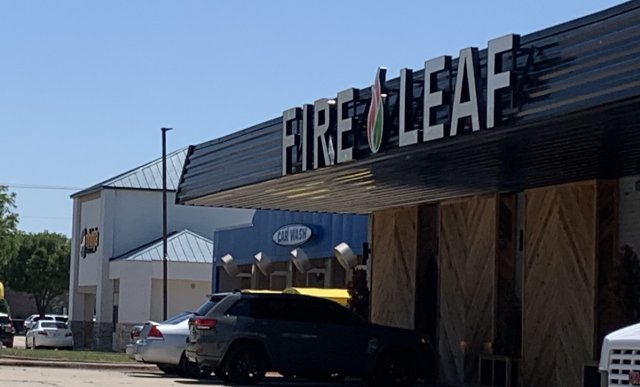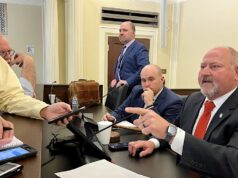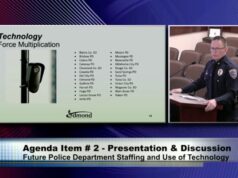

At 61, Matthew Koontz came to Oklahoma from Michigan hoping to provide a boost for his retirement savings by making his play in Oklahoma’s medical marijuana industry as a grower, and eventually, a dispensary owner selling his own products. But what looked to be a dream come true has slowly dissolved into a regulatory nightmare and a licensure limbo.
“The idea was to spend the money we had saved and invest in this thing and then try to save enough over the next 10 years to have a good retirement at the ripe old age of 70,” Koontz said. “But right now, it doesn’t look good.”
On May 21, Gov. Kevin Stitt vetoed HB 3228, which could have provided Koontz and other marijuana business owners some relief. During 2020’s abbreviated legislative session, the bill had become a combination of several adjustments to policies within the state’s medical marijuana industry. It featured a provision to protect dispensaries that had been licensed prior to when a 2019 bill established a 1,000-foot boundary around preschools, and it would have authorized home delivery of medical marijuana products.
But the bill’s provision intended to address what has turned Koontz’s life into a roller coaster ride of bureaucracy and frustration focused on residency requirements for dispensary and grow operators licensed by the Oklahoma Medical Marijuana Authority.
The residency requirement issue has the potential to impact numerous medical marijuana businesses across the state in the coming weeks, and the prospect of losing their businesses has stirred angst among those affected.
AG opinion created uncertainty
Koontz received his grow license in April 2019, about 10 months after voters passed State Question 788 to legalize medical marijuana.
Unfortunately for him, HB 2612 took effect on Aug. 29, 2019. Called the “unity bill” to the chagrin of some, HB 2612 established medical marijuana guidelines in state statute and changed the definition of what was considered a “resident” for purposes of commercial medical marijuana licenses. It required applicants to have lived in Oklahoma two years prior to applying or to have resided in the state at least five of the previous 25 years.
Initially, only 75 percent of a medical marijuana operation’s ownership had been required to be considered Oklahoma residents. Those who applied only needed to submit a driver’s license, a residential lease agreement or a utility bill to qualify.
Having done that, Koontz figured he would be exempted along with other dispensary owners and grow operators who had moved to Oklahoma from other states prior to HB 2612’s new requirement.
It didn’t work out that way. Just as his operation was beginning to yield product for sale, Koontz attempted to renew his grow license in April 2020 — a $2,500 non-refundable fee — and was denied by the OMMA because of the new residency requirement.
In February 2020, Oklahoma Attorney General Mike Hunter issued a formal opinion that “the durational residency requirement should not be applied retroactively to revoke licenses” issued before HB 2612 took effect. But Koontz and others still needed their licenses to be renewed by the OMMA.
This year, House Majority Floor Leader Jon Echols (R-OKC) attempted to change the residency requirement in HB 3228. After the bill was vetoed by Stitt, Echols said the House had the votes to override the governor but that the Senate did not.
Koontz said the situation has created two groups of licensees.
“One group with less than two years of residency that received their license before 8-29-2019 under the old rules that can renew their licenses, and another group with less than two years of residency that also received their license before 8-29-2019 under the old rules that cannot renew their license,” he said.
Koontz not alone
Oklahoma City attorney Blake Johnson represents some of those involved in Oklahoma’s growing medical marijuana industry. He said Oklahoma’s law attracted people from out of state looking to start their own business.

“A lot of people did that because 788’s licensing scheme is so permissive. That is to say the barriers to entry are extraordinarily low as compared to basically any other jurisdiction with legal weed,” he said. “Because of that, 788 caused a huge rush of people to move to start a cannabis business in Oklahoma.”
Johnson said in places like California, which has both a recreational and medical marijuana program, the cost of starting a business and the limited number of licenses available are often prohibitive for most would-be entrepreneurs. Johnson said it can cost up to $2 million to enter the cannabis industry in California.
“A lot of people who have spent their careers working for richer people in the cannabis industry saw 788 as an opportunity to own a piece themselves,” he said.
‘I’m literally about to lose everything’
Koontz said he has spent about $400,000 on his quest to enter Oklahoma’s cannabis industry. He holds licenses to operate a dispensary and to grow marijuana.
“We had planned to go vertical because we found out that if you sell your own product, you will make a lot more money,” he said. “So in this roller coaster, we’ve gone from thinking we’re going out of business, to the next day going out to look for a place to open a dispensary, and back again. It’s been very stressful.”
Koontz said he wonders if the decision not to exempt people like him from the new residency law is an attempt at culling the herd and reducing competition. But mostly, he just wants to do business.
“I’m literally about to lose everything right now,” he said. “We had a nice place in Michigan, and we sold out of that and spent a ton of money on infrastructure down here, and now after all that we still don’t know what’s going to happen to our business.”
Legal challenges ahead
If the situation is not resolved, there is expected to be a number of legal challenges to the law from owners like Koontz who suddenly find themselves in fight for their survival.
Johnson said residency requirements traditionally have not been upheld by the Supreme Court.
“So I got a license and opened, but suddenly a year later I’m not qualified for a license because I moved to California on my sixth birthday? That’s sort of nonsensical to begin with,” Johnson said. “The Supreme Court has always struck down residency restrictions.”
Pointing to HB 3228 being sent to Stitt, Johnson said “the Legislature seemingly recognized a lot of people were about to be unlicensed because they included this.”
Johnson said in a time when the state is challenged economically because of the price of oil and the continued novel coronavirus pandemic, entrepreneurs should be welcomed.
“I think it’s really misguided policy that the general philosophy seems to be that we don’t want non-Oklahomans participating in the industry,” Johnson said. “There’s something really stupid about that.”
Location proximity also in flux

Another section of HB 3228 would have provided an exemption for cannabis dispensaries currently in limbo thanks to the Legislature’s 2019 definition of the word “school,” which effectively added preschools into the boundary equation.
This session’s bill would have allowed dispensaries to remain in operation if they fall within 1,000 feet of a school after initially being licensed.
Rep. Scott Fetgatter (R-Okmulgee) said more than 200 dispensaries and grow operations across the state could be forced to shutter their businesses if that is not resolved.
“We have people who have invested their livelihoods, and it doesn’t matter if you agree with marijuana or not, they have exercised their rights to be self employed,” he said.
Fetgatter said he hopes there will be a special legislative session to pass HB 3228’s licensure tweaks into law.
“The other option is they get put out of business,” Fetgatter said.
Stitt’s veto message on HB 3228 said the bill’s changes “were not fully scrutinized,” but many industry experts believe his objection to the bill centered around its allowance for home delivery of medical marijuana products.
Johnson represents Fire Leaf, a chain of medical marijuana dispensaries with eight locations around the state. Its Edmond location, a building the company purchased and renovated into a cannabis dispensary, is now at risk for closure because of its proximity to a preschool. The preschool limitation was not in law when the Edmond location was selected.
Johnson said the functional definition of “preschool” is nebulous in and of itself. He said the ultimate failure of HB 3228 to address Oklahoma medical marijuana licensure issues could have an effect on patients.
“I think depending on where you shop for your medicine, there is a realistic chance that the dispensary you rely on could lose its license,” he said.
OMMA spokeswoman Terri Watkins said the agency is aware of the discrepancies in the law and is working to find a solution. The OMMA is scheduled to meet at 1 p.m., Monday, July 13, at the Oklahoma State Department of Health.
Follow @NonDocMedia on:




















